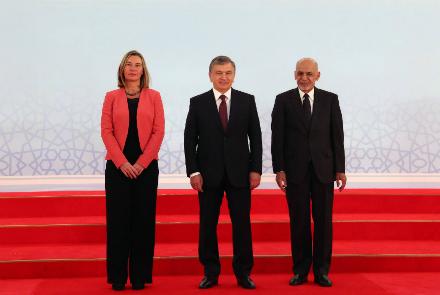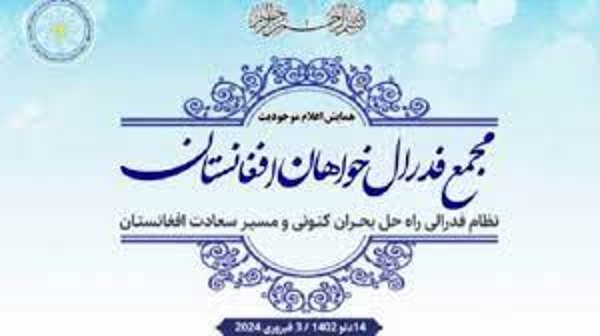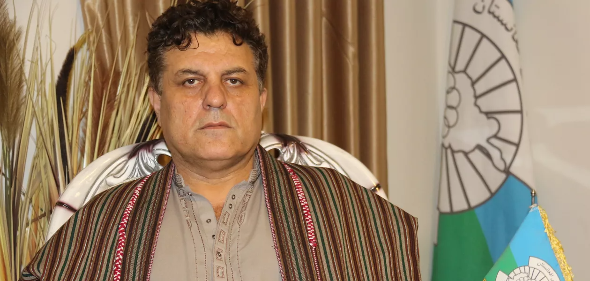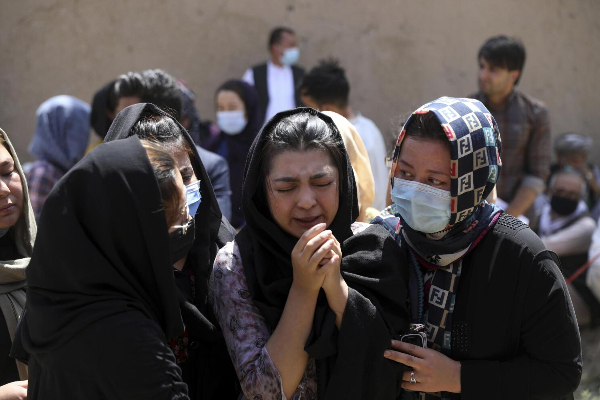Senior diplomats and representatives of regional and Western countries have wrapped up a day-long conference here in Tashkent to call on the Taliban to lay down arms and embrace the peace offer made by the Afghanistanian government at the Kabul Process conference last month.

On Tuesday, delegates from 23 countries and two organizations adopted a seven-page, 24 item, declaration pledging support to an Afghan-led and Afghan-owned peace process.
The conference was opened by President Ashraf Ghani and his Uzbek counterpart Shavkat Mirziyoyev and attended by Foreign Ministers of Russia, all Central Asian republics, Pakistan, deputy ministers of Iran, China, India and the US and EU foreign policy chief Federica Mogherini and senior diplomats from the UK, Germany, UAE, Qatar among others.
Key points in the declaration included regional cooperation on fighting terrorism, eradicating drug production and smuggling and ensuring all security assistance to Afghanistan be provided through the Afghan government only.
In response, the secular northern neighbor to Afghanistan, Uzbekistan, extended a rare but welcome invitation - to host a regional summit as a follow up to the Kabul Process meeting.
The last time Tashkent hosted a conference about peace in Afghanistan was the 6+2 Contact Groupís meeting in July 1999.
This weekís initiative, at the behest of Uzbekistan President Shavkat Mirziyoyev, resulted in a major show of support for Afghanistan in its fight against terrorism and as Thomas Shannon, the US under secretary of state, said: "Good-neighborliness is an important first step."
He said: "It is important to note the bravery and courage of President Shavkat Mirziyoyev for the organization of this conference. These are very important, we can say, revolutionary steps that contribute to the improvement of relations and the solution of many complex issues."
Noting the severity of the situation in his neighboring country, Mirziyoyev said in his opening speech at the summit on Tuesday that the situation in Afghanistan has a direct impact on Uzbekistan.
"The security of Afghanistan is the security of Uzbekistan," he said adding that "the involvement of all new players in the conflict has led to a worsening of the conflict. It has ceased to be purely Afghan, becoming increasingly a complex international problem."
In line with this, regional countries, in particular, on Tuesday strongly opposed any provision of financial support, material assistance or arms to the Taliban and Daesh.
This new declaration, which is in essence a framework on how regional and international countries can assist Afghanistan with ending the ongoing war, was drawn up and approved at a Senior Officials Meeting ahead of the peace summit and adopted by delegates after the two-day ministerial-level meeting.
Among the participating countries that adopted the declaration was Pakistan and Iran as well as Russia, China, Qatar and India, the US, a number of European Countries and other Central Asian states.
All nations attending pledged to support Afghanistanís peace process and agreed that a political settlement, led by Afghanistan, but supported by close regional counter-terrorism and counter-narcotics cooperation were key to peace and prosperity in Afghanistan.
The delegates also agreed to "respect sovereignty, independence, territorial integrity and national unity of Afghanistan and the efforts of its people and government for bringing peace, stability and development to their country."
They also pledged to support Central Asian statesí efforts to advance the peace process and socio-economic development in Afghanistan.
Nations involved agreed to call on the Taliban "to recognize their share of responsibility for bringing peace and security to Afghanistan." This would be done in the context of a mutually agreed format, the declaration stated.
The document also noted that a political settlement between government and the Taliban would be a "victory for all parties and a defeat for none."
According to the declaration, this move should guarantee the inclusion of the Taliban in the political process "as a legitimate political actor."
It went on to state however that in turn, the Taliban needs to denounce all violence and cut ties with international terrorist groups including al-Qaeda, Daesh and other transnational terrorist organizations.
In addition, the rights of women were noted and the need for full and meaningful participation by women in all aspects of Afghanistanís society, including the peace process, was stressed.
Delegates who adopted the declaration also condemned recent attacks in Afghanistan and denounced terrorism in all its forms.
They acknowledged the "serious and common threats emanating from the nexus between trans-national terrorism, narcotics and organized crime to the security and stability of Afghanistan, the region and the international community at large."
The importance of strengthening cooperation with Afghanistan in the fight against narcotics was highlighted as was the fight against smuggling of weapons, which are sources of financing for terrorism.
According to the declaration, delegates "recognize that terrorism, narcotics and organized crime are interlinked global threats and require a common strategy based on the UN Global Counter Terrorism Strategy."
As item 20 of the declaration states, delegates "affirm that all security assistance to Afghanistan should be provided through the Afghan government and strongly oppose any provision of financial support, material assistance or arms to the Taliban and ISIS/Daesh, which only serves to destabilize Afghanistan and prolong the conflict."
This declaration was adopted by Afghanistan, China, France, Germany, India, Iran, Italy, Japan, Kazakhstan, Kyrgyzstan, Pakistan, Qatar, Russia, Saudi Arabia, Tajikistan, Turkey, Turkmenistan, United Arab Emirates, United Kingdom, United States, Uzbekistan, EU and UN.
LINK: https://www.ansarpress.com/english/9849
TAGS:






























 Ghani Removed From UN Heads of State List
Ghani Removed From UN Heads of State List 




